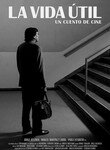As general popularity of cinema decreases over time because of inflation in costs and the emergence of pirating, many local theatres are forced out of competition and cinephiles are denied the chance to further their education. This stretches out as far as Uruguay, where the love for film is rich but support for their cinemateca is less than what’s necessary to keep it afloat. As this Montevideo theatre faces eviction, we learn (as its workers do) we must be inspired by film and use that to keep moving along.
A Useful Life sets the scene instantly: Jorge (Jorge Jellinek) has worked at the Cinemateca for almost thirty years. He runs their local radio show and helps with the general maintenance but even that’s not enough to save the place from closure. As Jorge learns of his fate he evolves into a different person, following the steps of famous on-screen legends (Fred Astaire and the like) into becoming a shadow of his former self. The film, shot in b&w, splits Jorge’s personalities straight down the middle as much as the story itself.
![A Useful Life [La vida util] (BAFF Review) usefullife1 600x328 A Useful Life [La vida util] (BAFF Review)](/wp-content/uploads/usefullife1-600x328.jpg)
Director Federico Veiroj gives us a crawling film with minimal plot as an auteur, but it somehow comes out with a lot of (intended) meaning – about the fate of cinema and how a person can draw from it. Cinemateca owner Martinez’s (Manuel Martinez Carril) radio discussion is the most obvious example, but Jorge’s exploration of himself and his abilities is where the film hits its highest note. The film changes dramatically for the second half; an interesting paradox to the bleak cinema is the lively law school where Jorge tries chasing crush Paola (Paola Venditto). A bonus for Veiroj was getting Jellinek (a real-life Uruguayan critic) on board.
Verdict:
A Useful Life has a lot of validity to it, but even at 67 minutes it feels drawn out.
A Useful Life screens as part of the 2011 Bigpond Adelaide Film Festival. Read all of our BAFF11 coverage here.
 Follow the author Katina Vangopoulos on Twitter.
Follow the author Katina Vangopoulos on Twitter.
![A Useful Life [La vida util] (BAFF Review)](/wp-content/uploads/hi_usefulnotmain1-e1299120919579-700x312.jpg)

![Alamar [To The Sea] (Review) Alamar [To The Sea] (Review)](/wp-content/uploads/alamarimages-150x150.jpg)
![The Recipe [2010] (BAFF Review) The Recipe [2010] (BAFF Review)](/wp-content/uploads/photo1354581-150x150.jpg)
![In A Better World [Hævnen] (Review) In A Better World [Hævnen] (Review)](/wp-content/uploads/843752_5891-150x150.jpg)
![The Illusionist [L'illusionniste] (BAFF Review) The Illusionist [L'illusionniste] (BAFF Review)](/wp-content/uploads/2010_the_illisionist_0021-e1299486014804-150x150.jpg)









